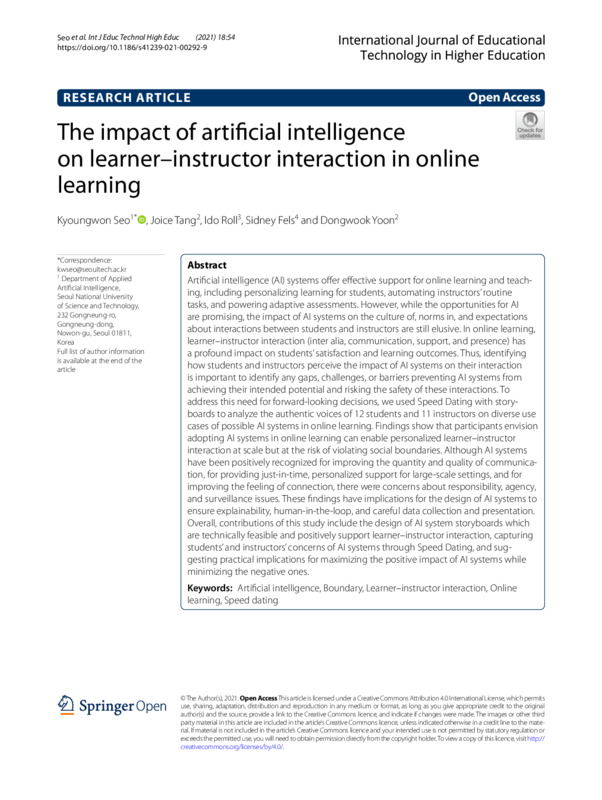The impact of artificial intelligence on learner–instructor interaction in online learning
Item
-
Title
-
The impact of artificial intelligence on learner–instructor interaction in online learning
-
Abstract
-
Artificial intelligence (AI) systems offer effective support for online learning and teaching, including personalizing learning for students, automating instructors’ routine tasks, and powering adaptive assessments. However, while the opportunities for AI are promising, the impact of AI systems on the culture of, norms in, and expectations about interactions between students and instructors are still elusive. In online learning, learner–instructor interaction (inter alia, communication, support, and presence) has a profound impact on students’ satisfaction and learning outcomes. Thus, identifying how students and instructors perceive the impact of AI systems on their interaction is important to identify any gaps, challenges, or barriers preventing AI systems from achieving their intended potential and risking the safety of these interactions. To address this need for forward-looking decisions, we used Speed Dating with storyboards to analyze the authentic voices of 12 students and 11 instructors on diverse use cases of possible AI systems in online learning. Findings show that participants envision adopting AI systems in online learning can enable personalized learner–instructor interaction at scale but at the risk of violating social boundaries. Although AI systems have been positively recognized for improving the quantity and quality of communication, for providing just-in-time, personalized support for large-scale settings, and for improving the feeling of connection, there were concerns about responsibility, agency, and surveillance issues. These findings have implications for the design of AI systems to ensure explainability, human-in-the-loop, and careful data collection and presentation. Overall, contributions of this study include the design of AI system storyboards which are technically feasible and positively support learner–instructor interaction, capturing students’ and instructors’ concerns of AI systems through Speed Dating, and suggesting practical implications for maximizing the positive impact of AI systems while minimizing the negative ones.
-
Creator
-
Kyoungwon Seo
-
Contributor
-
Joice Tang
-
Ido Roll
-
Sidney Fels
-
Dongwook Yoon
-
Date
-
2021
-
Extent
-
24 pages
-
Format
-
PDF
-
Identifier
-
ISSN: 2365-9440
-
EISSN: 2365-9440
-
DOI: 10.1186/s41239-021-00292-9
-
PMID: 34778540
-
Language
-
English
-
Is Part Of
-
International Journal of Educational Technology in Higher Education, 2021-10, Vol.18 (1), p.54-54, Article 1
-
Publisher
-
Cham: Springer International Publishing
-
Source
-
Gale Academic OneFile
-
Type
-
Text
-
Subject
-
Artificial intelligence
-
Computational intelligence
-
Ethics
-
Boundary value problems
-
Web-based instruction
-
Instructional systems--design
-
Educational technology
-
Teacher-student relationships
-
Machine learning
-
Research
-
Computer science

